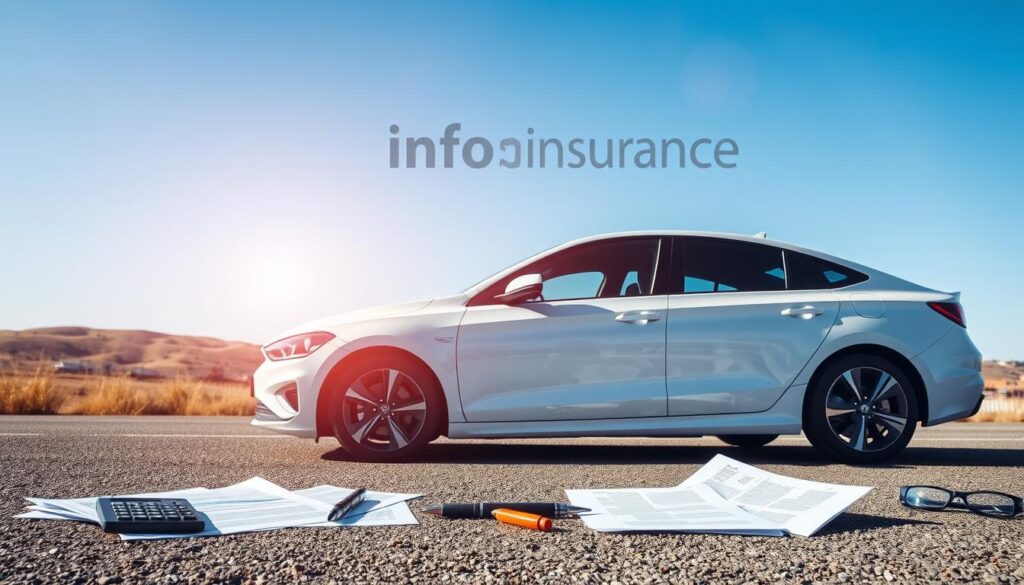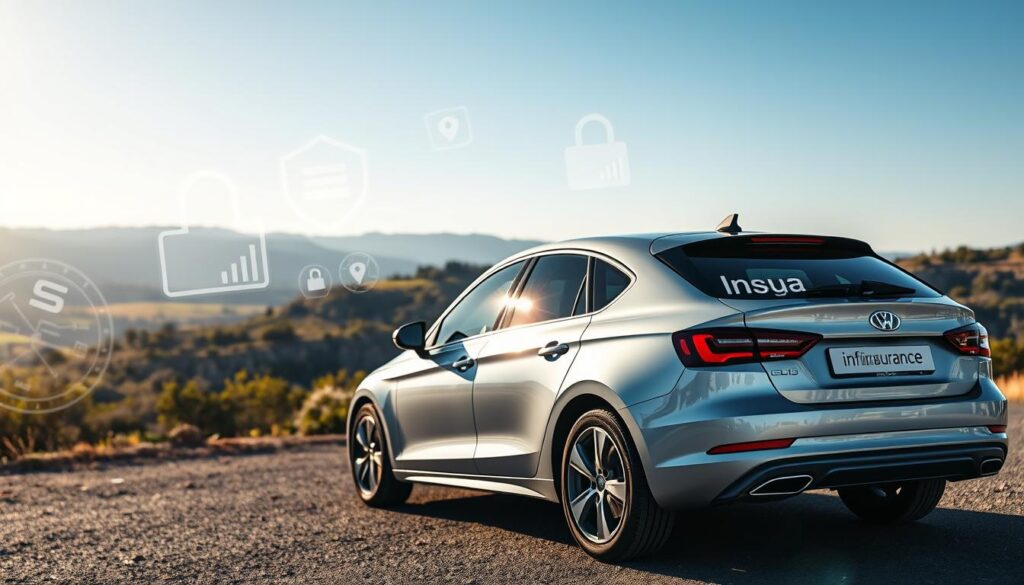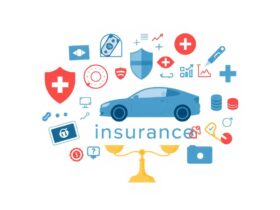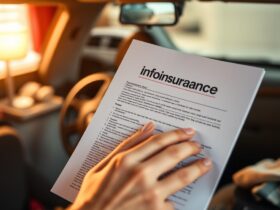Imagine needing to drive a car that’s not yours. This could be a borrowed vehicle, a family member’s car, or one you’re thinking of buying. The question of insuring a car not in your name can be tricky. We’ll look into the details of can i insure a car not in my name and insuring vehicle not owned. We’ll guide you through the legal and practical sides to help you make smart choices.
What if you could insure a car that’s not yours? Does that sound right? This article dives into non-owner car insurance. We’ll uncover the hidden complexities and potential problems you might face. Get ready for a journey that will challenge your assumptions and give you the knowledge to handle insuring a vehicle not registered to you.
Key Takeaways
- Understanding the basics of non-owner car insurance and its different coverage options.
- Exploring the legal requirements and state-specific regulations surrounding insuring a non-owned vehicle.
- Identifying situations where you might need to insure a car that’s not in your name.
- Navigating the cost considerations and factors that impact non-owner insurance premiums.
- Addressing common challenges and finding solutions to insure a vehicle not registered to you.
Understanding Non-Owner Car Insurance Basics
Auto insurance can be tricky, especially for cars not in your name. Non-owner car insurance offers liability and other key protections. Knowing the basics helps you make smart choices and stay safe on the road.
Types of Non-Owner Insurance Coverage
Non-owner auto insurance policies usually include:
- Liability coverage: It protects you if you’re legally to blame for accidents or injuries to others.
- Personal injury protection (PIP): It covers medical costs and lost wages for you and your passengers, no matter who’s at fault.
- Uninsured/underinsured motorist coverage: It helps if you’re hit by a driver with little or no insurance.
Legal Requirements and State Regulations
State laws on non-owner auto insurance vary. Some states require specific coverage levels, while others don’t. It’s crucial to check your state’s laws to avoid fines and penalties.
Common Insurance Terms to Know
When looking into non-owner auto insurance, get to know these terms:
- Liability limits: The most an insurer will pay for damages or injuries you cause.
- Deductible: The amount you pay first before insurance kicks in.
- Premium: The regular payment to keep your non-owner auto insurance policy active.
Grasping the basics of non-owner auto insurance, state laws, and insurance terms is key. It ensures you’re covered when driving a car not in your name.
Can I Insure a Car Not in My Name?
Insuring a car not in your name can be tricky. It’s possible, but the steps are different from owning a car. Your relationship to the owner, state laws, and the insurance company’s rules matter a lot. These factors help decide if you can get car insurance without ownership.
If you use the car a lot or are related to the owner, you might get coverage for non-titled car. Insurance companies look at your driving record, how often you use the car, and why. They use this info to decide if you can get a non-owner policy.
Every state and insurance company has its own rules. Some are strict, while others are more open. Knowing the legal implications and state-specific requirements is key to success.
Getting insurance for a car not in your name depends on many things. It’s important to look into your options and talk to your insurance company. This way, you can find the best solution for your situation.

“Insuring a car that’s not in your name can be a complex process, but it’s not impossible. The key is understanding the nuances and working closely with your insurance provider to find the right solution.”
Legal Implications of Insuring Someone Else’s Vehicle
Insuring a car not in your name can be tricky. You need to know about insurance rules, state laws, and who’s liable. It’s key for those looking for temporary car insurance or covering a borrowed vehicle.
Insurance Company Policies
Insurance companies have rules about who can be listed on a policy. Some only cover the car’s owner. Others might let you insure a car you don’t own, but with limits. Always check the insurer’s rules and get their okay before buying a non-owner policy.
State-Specific Requirements
Rules for insuring a borrowed car vary by state. Some states require the car owner’s permission or proof of their insurance. Knowing your state’s laws is vital to avoid legal trouble.
Liability Considerations
Insuring a car not in your name raises liability questions. If you crash while driving it, your non-owner policy might not protect you as much. It’s important to understand your policy and potential liability.

“Insuring a non-owned vehicle can be a complex process, but it’s often necessary when borrowing a car or needing temporary coverage. Understanding the legal implications is crucial to ensure you’re protected and compliant with state and insurance company requirements.”
Situations When You Might Need to Insure a Non-Owned Car
Auto insurance depends a lot on who owns the car. Sometimes, you might need to insure a car that’s not yours. This could happen if you borrow a car for a long time, drive rental cars often, or use a family member’s car a lot.
Insuring a non-owned car can be very helpful. For example, if you borrow a car from a friend or family member for a long time, you’ll need non-owner insurance. It protects you in case of an accident. Also, if you rent cars a lot, non-owner insurance keeps you safe while driving.
Another reason to insure a non-owned car is if you drive a family member’s car a lot. Even if you don’t own it, you might need your own insurance. This is to protect you and the car’s owner in case of an accident.

Non-owner insurance is a smart choice in these situations. It gives you the coverage you need to drive safely. Whether it’s a rental, a borrowed car, or a family member’s vehicle, you can drive with confidence.
Insurance Options for Borrowed Vehicles
Getting insurance for a borrowed car can be tricky. But, there are many options to keep you covered. Whether you need short-term or long-term insurance, knowing your choices helps you decide.
Short-Term Insurance Solutions
For quick needs, like a weekend trip, temporary car insurance is great. It offers liability, collision, and comprehensive coverage for a short time. This way, you avoid long-term commitments.
Extended Coverage Plans
If you often borrow cars or need more protection, extended coverage is better. These plans last longer and cover more borrowing instances. They might also include extras like roadside help or car rental payback.
Special Circumstances Coverage
For special cases, like business trips or long rentals, you might need custom insurance. These policies fit your unique needs and offer extra coverage not found in standard plans.
When picking insurance for borrowed cars, think about your needs and the borrowing time. Also, consider any special situations. Knowing your options ensures you’re well-covered and worry-free when driving a car not yours.

Insuring Family Members’ Cars: What to Know
Insuring a family member’s car or a non-titled vehicle has its own set of rules. It’s a smart move, but knowing the pros and cons is key. This way, you can make the right choice for your family.
Legal stuff matters a lot here. Insurers have rules for family cars, and states have their own laws too. Make sure you check these out to avoid any trouble later.
Liability is another big thing to think about. If the car gets into an accident, the insurance might cover the driver, even if they’re not the owner. Knowing what’s covered and what’s not is very important.
But, there are good sides too. Insuring a family member’s car can cover vehicles not in your name. It also keeps your family’s cars safe and covered all the time.
“Insuring a family member’s car can be a practical solution, but it’s important to understand the unique considerations and potential challenges involved.”
To do it right, follow these steps:
- Read the insurer’s rules and state laws carefully
- Think about the liability and make sure you’re covered
- Talk things over with your family member and the insurance company
- Look for ways to save money on insurance
By thinking about these points, you can make smart choices. This way, your family’s cars will be safe, even if they’re not in your name.
Cost Considerations and Premium Factors
Getting auto insurance for a non-owned vehicle can be complex. Several factors affect the cost of your coverage. Knowing these can help you find a good deal on a non-owner auto policy.
Insurance Rate Determinants
The price of a non-owner car insurance policy depends on many things. Your driving history, how you plan to use the vehicle, and the coverage level you need are key. Insurers also look at the car’s make, model, age, your location, and credit score.
Ways to Reduce Premium Costs
Want to pay less for non-owner auto insurance? Here are some tips:
- Shop around – Compare quotes from different insurance companies to find the best rate for you.
- Maintain a clean driving record – Avoiding tickets and accidents can lower your premiums.
- Opt for higher deductibles – A higher deductible means lower monthly or yearly costs.
- Consider bundling policies – If you have other insurance, like homeowner’s or renter’s, you might save by combining them with your non-owner auto policy.
By understanding what affects non-owner auto insurance rates and using cost-saving tips, you can get great coverage without breaking the bank.
Documentation Required for Non-Owner Insurance
Getting car insurance without owning the vehicle is a bit different. You need specific documents to insure a car that’s not yours. Let’s look at the key papers you’ll need for non-owner car insurance.
Key Documents to Provide
- Proof of Identity – Your driver’s license or state-issued ID is needed to prove who you are and if you’re eligible for coverage.
- Proof of Residency – You’ll need to show where you live. This can be utility bills, bank statements, or a lease/mortgage agreement.
- Proof of Vehicle Ownership – The owner’s vehicle registration and/or title are needed to confirm the car is not yours.
- Proof of Insurance on the Owned Vehicle – If you already have auto insurance on another car, you’ll need to provide this information.
The insurance company might ask for more documents. This could include proof of your relationship to the vehicle owner or a letter of permission to insure the car.
Having all your paperwork ready before applying for car insurance without ownership makes things easier. It shows you’re responsible and informed. This way, you’ll be able to insure a vehicle not owned by you smoothly.
Common Challenges and How to Overcome Them
Getting insurance for a car not in your name can be tricky. But, with the right steps, you can get past these hurdles. Let’s look at two big problems and find good solutions.
Insurance Company Restrictions
Some insurance companies might not want to cover a car not in your name. They might think there’s a risk of fraud or misuse. To get around this, explain your situation clearly and why you need the coverage.
- Have documents ready, like a rental agreement or permission from the owner, to show you need the coverage.
- Look for insurance companies that are okay with covering cars not in your name.
- Think about adding yourself as an “additional insured” on the owner’s policy. This might be easier.
Documentation Issues
Getting the right papers to insure a car not in your name can be hard. Insurance companies want proof of ownership or permission from the owner.
- Work with the car’s owner to get a signed letter or permission to insure the car.
- Give any rental agreements, lease papers, or other documents that show you can use the car.
- If the car is from a family member, get a statement from them saying you can insure it.
By tackling these common problems early and providing the right documents, you can better your chances of getting insurance for a car not in your name.
Risks and Benefits of Non-Owner Car Insurance
When thinking about non-owner auto insurance, it’s key to look at both sides. This insurance can protect your wallet, but it has its own set of rules and limits.
Potential Risks
- Coverage Gaps: Non-owner car insurance might not cover as much as a regular auto policy. This could leave you exposed in some cases.
- Liability Concerns: It does offer liability coverage, but it might not be as strong as a policy for a car you own.
- Flexibility Limitations: You might find that the policy’s rules on what cars you can drive don’t fit your needs.
Potential Benefits
- Financial Protection: It can help protect you from big financial hits if you’re in an accident.
- Flexibility: It’s often cheaper than a full auto policy, which is good if you don’t drive often.
- Fulfilling Legal Requirements: In some places, you need a non-owner auto policy to legally drive a car you don’t own.
“Ultimately, the decision to purchase non-owner car insurance should be based on your specific circumstances and the level of coverage you require.”
By thinking about the good and bad, you can decide if auto insurance for non-owner is right for you.
Conclusion
In this article, we’ve looked into insuring a car not in your name. We covered the basics of non-owner car insurance and the legal aspects. We also talked about the different coverage options available.
Insuring a borrowed car, a family member’s vehicle, or any other car not owned by you is possible. It’s important to think about your situation and follow state laws and insurance rules. Knowing how to insure a car not in your name helps protect your finances.
Non-owner car insurance is useful in many situations. But, it’s crucial to research well, read policy details carefully, and talk to your insurance company. This way, you can find the right coverage for you. Being well-informed and proactive helps you handle insuring a car not in your name confidently.
FAQ
Can I insure a car that is not in my name?
Yes, you can insure a car not in your name. This is called “non-owner car insurance.” It offers liability protection when you borrow or rent cars often.
What is non-owner car insurance?
Non-owner car insurance covers drivers who don’t own the cars they drive. It’s great for those who rent cars, borrow from friends, or need coverage for cars they don’t own.
What does non-owner car insurance cover?
It covers liability for damages and injuries you cause in accidents. It might also include uninsured/underinsured motorist coverage and personal injury protection, based on your state and policy.
Do I need to be listed on the car’s registration to get non-owner car insurance?
No, you don’t need to be on the car’s registration for non-owner car insurance. It’s for drivers who don’t own the cars they drive.
What are the legal requirements for insuring a car not in my name?
Legal requirements vary by state and insurance company. Many states require liability insurance, even if you’re not the owner. Check your state’s laws and the insurance company’s rules.
How much does non-owner car insurance cost?
Costs vary based on your driving history, state, and coverage needs. Non-owner insurance is usually cheaper than full-coverage for a vehicle you own. Compare quotes to find the best deal.
What documents do I need to get non-owner car insurance?
You’ll need your driver’s license, the car’s VIN, and details about your driving history and claims. The insurance company might also ask for proof of permission to drive the vehicle.
Can I insure a family member’s car?
Yes, you can insure a family member’s car, even if it’s not in your name. It’s good if you drive it often or use it mostly. But, check with the insurance company for any specific rules or restrictions.
What are the risks of insuring a car not in my name?
Insuring a car not in your name might lead to coverage gaps or issues with the insurance company. Some insurers have special rules for non-owner policies. Always review the policy terms and conditions carefully.






Leave a Reply
View Comments